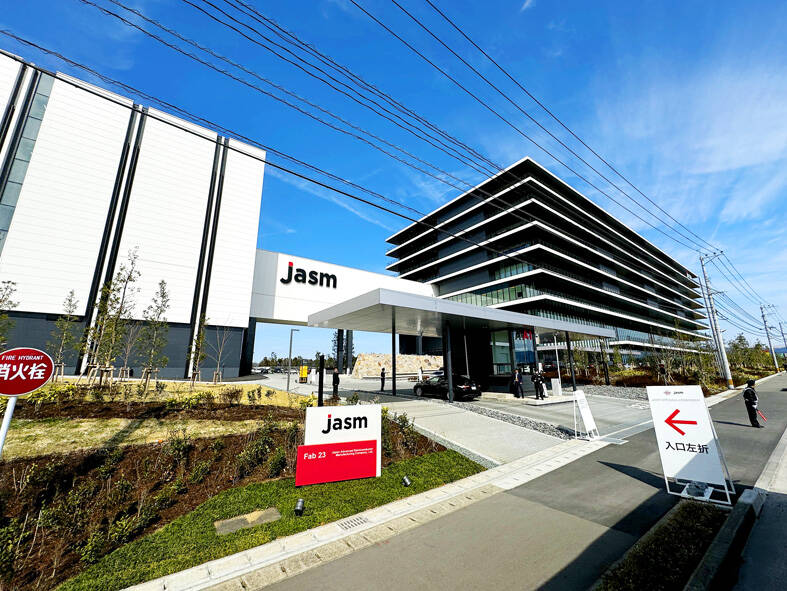Approved outbound investments by the Department of Investment Review, excluding those to China, reached a record US$24.19 billion in the first half of this year, surging 169.64 percent from a year earlier, the Ministry of Economic Affairs (MOEA) said on Monday.
That was mainly driven by Taiwan Semiconductor Manufacturing Co’s (台積電) investments of US$5.26 billion in its Japanese subsidiary and US$5 billion in its US unit, as well as WT Microelectronics Co’s (文曄科技) investment of US$3.98 billion to acquire Canadian electronic components distributor Future Electronics Inc, the ministry said in a statement.
The investment amount in the first half outpaced the US$23.58 billion approved for the whole of last year, it said.

Photo: CNA
As companies continue to diversify their supply chains and reduce their dependence on China, approved investments to countries included in the government’s New Southbound Policy surged 113.23 percent to US$4.53 billion in the first six months, the ministry said.
That was led by Hon Hai Precision Industry Co’s (鴻海精密) investments of US$2.49 billion in Foxconn Singapore Pte Ltd and NT$15 billion (US$459.77 million) in Foxconn EV Singapore Holdings Pte Ltd, along with other local firms’ increased investments in Vietnam and Thailand, the ministry added.
The New Southbound Policy, introduced in 2016, is designed to enhance trade and exchanges between Taiwan and 18 nations in Southeast Asia, South Asia and Oceania.
In comparison, outbound investments to China fell 19.03 percent year-on-year to US$1.55 billion during the first six months, the ministry said.
Meanwhile, foreign direct investment (FDI) approved by the department totaled US$3.25 billion in the first half, down 49.3 percent from the same period last year and marking the lowest in six years, the ministry said, attributing it in part to a high comparison base the previous year.
FDI measures the investment activities of foreign firms, including the incorporation of a subsidiary or joint venture, a cash injection into a local unit, or mergers or acquisitions of domestic companies.
A high comparison base last year was also a factor behind the 92.3 percent annual decline in approved investments from New Southbound Policy countries to US$172.63 million during the first six months, the ministry said.
That is because in the first half of last year Singapore-based DBS Bank Ltd (星展銀行) gained approval to inject NT$52 billion in new capital into DBS Bank Taiwan (星展台灣), and Raiden APAC Pte Ltd, also based in Singapore, secured permission to inject capital of NT$3.19 billion into Taiwan Google Infrastructure Co (台灣科高基礎設施), it said.
The FDI figure excludes investments from China. The department approved US$16.37 million in investments by Chinese firms in the first six months, down 1.74 percent from a year earlier, the ministry said.

When an apartment comes up for rent in Germany’s big cities, hundreds of prospective tenants often queue down the street to view it, but the acute shortage of affordable housing is getting scant attention ahead of today’s snap general election. “Housing is one of the main problems for people, but nobody talks about it, nobody takes it seriously,” said Andreas Ibel, president of Build Europe, an association representing housing developers. Migration and the sluggish economy top the list of voters’ concerns, but analysts say housing policy fails to break through as returns on investment take time to register, making the

NOT TO WORRY: Some people are concerned funds might continue moving out of the country, but the central bank said financial account outflows are not unusual in Taiwan Taiwan’s outbound investments hit a new high last year due to investments made by contract chipmaker Taiwan Semiconductor Manufacturing Co (TSMC, 台積電) and other major manufacturers to boost global expansion, the central bank said on Thursday. The net increase in outbound investments last year reached a record US$21.05 billion, while the net increase in outbound investments by Taiwanese residents reached a record US$31.98 billion, central bank data showed. Chen Fei-wen (陳斐紋), deputy director of the central bank’s Department of Economic Research, said the increase was largely due to TSMC’s efforts to expand production in the US and Japan. Investments by Vanguard International

WARNING SHOT: The US president has threatened to impose 25 percent tariffs on all imported vehicles, and similar or higher duties on pharmaceuticals and semiconductors US President Donald Trump on Wednesday suggested that a trade deal with China was “possible” — a key target in the US leader’s tariffs policy. The US in 2020 had already agreed to “a great trade deal with China” and a new deal was “possible,” Trump said. Trump said he expected Chinese President Xi Jinping (習近平) to visit the US, without giving a timeline for his trip. Trump also said that he was talking to China about TikTok, as the US seeks to broker a sale of the popular app owned by Chinese firm ByteDance Ltd (字節跳動). Trump last week said that he had

STRUGGLING TO SURVIVE: The group is proposing a consortium of investors, with Tesla as the largest backer, and possibly a minority investment by Hon Hai Precision Nissan Motor Co shares jumped after the Financial Times reported that a high-level Japanese group has drawn up plans to seek investment from Elon Musk’s Tesla Inc to aid the struggling automaker. The group believes the electric vehicle (EV) maker is interested in acquiring Nissan’s plants in the US, the newspaper reported, citing people it did not identify. The proposal envisions a consortium of investors, with Tesla as the largest backer, but also includes the possibility of a minority investment by Hon Hai Precision Industry Co (鴻海精密) to prevent a full takeover by the Apple supplier, the report said. The group is